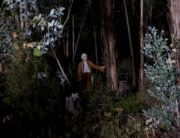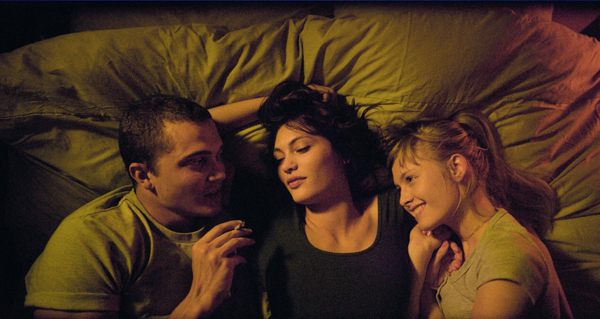Sometimes being trapped with a couple in a hotel room can be tedious. Despite well-meaning intentions and the strength of their actors, recent movies like Good Luck to You, Leo Grande and Three Thousand Years of Longing, both of which have long stretches set in hotel rooms, quickly wore out their welcome. Zachary Wigon’s perverse Sanctuary occasionally tries one’s patience, but it emerges as the most beguiling of this hotel movie trio. The motto of the hotel chain here is the clichéd adage “Some things never change.” In this feverish film, that motto is toyed with through the limitations and fluctuating power dynamics of class, gender, and kink.
The movie starts off winningly. Margaret Qualley appears with a blonde wig in a sharp suit as a lawyer questioning hotel chain scion Hal (Christopher Abbott). Little clues here and there hint that something about the situation seems off and slightly askew—fake-looking electronic devices; pat, scripted-sounding lines. Soon enough, Hal is polishing the marble floor of the bathroom in his black boxer briefs as Qualley’s dominatrix character taunts him mercilessly. The first act is a dynamite setup that could almost be a short film of its own, crystalizing much of screenwriter Micah Bloomberg’s themes of capitalistic malaise intertwined with sexual play. As it progresses, with high volume acting from Qualley in particular; excessive, thorny dialogue; and rampant scenery destruction, it becomes a bit less involving—broader and yet more banal.
However, there is an appealing dreamlike quality to the movie’s occasional illogicality: How is a room that’s been trashed suddenly incongruently tidy? How does a song suddenly shut off without anyone turning it off (the jovial Bonnie Pointer disco tune “Heaven Must Have Sent You”—a nice respite that allows for Qualley to dance around with abandon)? Because Sanctuary is about scripted sexual role-play, it can be difficult to discern at times the reality within the narrative—how much is made up and how much is real? On a coy meta level, the ambiguity is one of the more mysterious elements that make the film a possible rewarding watch on a repeat viewing, if one can endure sitting through the exhausting match between Qualley and Abbott in constricted spaces more than once.
Bloomberg’s script reaches for a blend of screwball and sharp-daggered social commentary of gender and wealth divides. It is undoubtedly a bold script, though it often ends up feeling shallow and unfunny in the deliberate chaos. Sanctuary could easily become a wicked and relentless staged play, though Wigon (The Heart Machine) and cinematographer Ludovica Isidori infuse the confined setting with ostentatious cinematic touches—sometimes, disconcertingly, an image will turn upside down—as if symbolically noting a reset.
The leads are well cast. Qualley has large, expressive eyes that dance around an array of emotions. Abbott’s Hal is more imperceptible. Qualley, an actor playing an actor for Abbott’s character, gives wily, crisp line readings (including a sultry, and silly, Pledge of Allegiance) as Hal stammers away—visibly more insecure. Qualley’s presence is an echo to her mother Andie MacDowell’s turn in a similarly idiosyncratic and themed Sex, Lies, and Videotape. Additionally, Ariel Marx’s score employs jazz (pitter-pattering drum brushes) and woozy romanticism, including the frilly intro music that could belong in a snappy Rock Hudson/Doris Day picture. The score ends up being apropos to Wigon’s playful and brusque version of a modern romantic comedy.







Leave A Comment